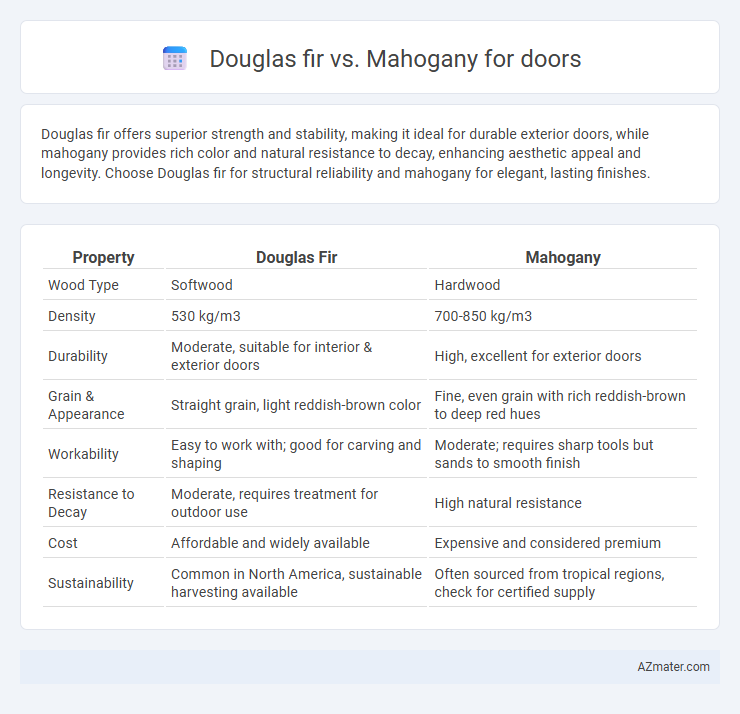Douglas fir offers superior strength and stability, making it ideal for durable exterior doors, while mahogany provides rich color and natural resistance to decay, enhancing aesthetic appeal and longevity. Choose Douglas fir for structural reliability and mahogany for elegant, lasting finishes.
Table of Comparison
| Property | Douglas Fir | Mahogany |
|---|---|---|
| Wood Type | Softwood | Hardwood |
| Density | 530 kg/m3 | 700-850 kg/m3 |
| Durability | Moderate, suitable for interior & exterior doors | High, excellent for exterior doors |
| Grain & Appearance | Straight grain, light reddish-brown color | Fine, even grain with rich reddish-brown to deep red hues |
| Workability | Easy to work with; good for carving and shaping | Moderate; requires sharp tools but sands to smooth finish |
| Resistance to Decay | Moderate, requires treatment for outdoor use | High natural resistance |
| Cost | Affordable and widely available | Expensive and considered premium |
| Sustainability | Common in North America, sustainable harvesting available | Often sourced from tropical regions, check for certified supply |
Introduction to Douglas Fir and Mahogany Doors
Douglas fir doors offer exceptional strength and durability, featuring a coarse grain and light reddish-brown color that complements various architectural styles. Mahogany doors are prized for their rich, deep reddish-brown hue and fine, straight grain, delivering elegance and natural resistance to decay and insects. Both woods provide reliable options for door construction, with Douglas fir favored for sturdiness and Mahogany valued for its luxurious appearance and longevity.
Wood Appearance and Grain Patterns
Douglas fir exhibits a straight, prominent grain with a warm reddish-brown hue that darkens over time, offering a rustic yet refined appearance suited for both traditional and modern doors. Mahogany features a rich, deep reddish-brown color with a more uniform and fine-grained texture, characterized by interlocking grain patterns that enhance its smooth, elegant finish. The visual contrast between Douglas fir's more pronounced grain and Mahogany's subtle, consistent grain pattern makes each wood ideal for doors emphasizing either natural ruggedness or sophisticated luxury.
Strength and Durability Comparison
Douglas fir offers superior strength with a Janka hardness rating of around 660, making it highly resistant to dents and wear, while mahogany's hardness typically ranges from 800 to 900, providing excellent durability and resistance to decay. Douglas fir's dense, straight grain structure enhances its structural stability, making it ideal for exterior doors exposed to harsh weather conditions. Mahogany, known for its natural resistance to rot and insect damage, maintains durability over time, especially in humid environments, but it can be softer and more prone to scratches compared to Douglas fir.
Resistance to Weather and Termites
Douglas fir offers excellent resistance to weather due to its dense grain and natural oils, making it less susceptible to moisture damage and warping in outdoor door applications. Mahogany, prized for its natural resistance to termites and decay, provides superior durability in termite-prone areas, with its tight grain structure preventing insect penetration. Choosing between Douglas fir and mahogany hinges on prioritizing weather resistance for harsher climates or termite resistance for regions with high insect activity.
Maintenance and Longevity
Douglas fir offers excellent durability with moderate maintenance requirements, needing periodic sealing to prevent moisture damage and preserve its natural grain over time. Mahogany showcases superior longevity due to its dense hardwood structure, resisting warping and insect damage, while requiring minimal upkeep apart from occasional polishing to maintain its rich color. Both woods provide long-lasting door solutions, but mahogany's inherent resistance to environmental factors reduces maintenance frequency compared to Douglas fir.
Cost and Availability
Douglas fir doors tend to be more cost-effective and widely available due to the tree's fast growth and abundant supply in North America. Mahogany doors, prized for their rich color and durability, generally come at a higher price point and may require sourcing from limited tropical hardwood suppliers, leading to increased lead times. Choosing Douglas fir offers budget-friendly options with steady availability, while Mahogany commands a premium typically justified by its luxurious aesthetics and long-lasting performance.
Environmental Impact and Sustainability
Douglas fir is considered more sustainable than mahogany due to its faster growth rate and greater availability, making it a renewable resource with lower environmental impact. Mahogany, often sourced from tropical rainforests, faces issues related to deforestation and habitat loss, contributing to its higher ecological footprint. Choosing Douglas fir for doors supports responsible forestry practices and reduces the carbon footprint associated with wood harvesting.
Insulation and Energy Efficiency
Douglas fir offers superior thermal insulation due to its dense grain structure, which helps reduce heat transfer and maintain indoor temperature stability. Mahogany, while durable and aesthetically appealing, has a lower R-value compared to Douglas fir, making it less effective in energy conservation. Choosing Douglas fir doors can significantly enhance energy efficiency and reduce heating and cooling costs in residential and commercial buildings.
Suitability for Different Door Styles
Douglas fir offers excellent strength and a straight grain pattern that suits modern and rustic door styles, providing durability and a warm, natural look. Mahogany features a rich, deep color and fine, uniform grain, ideal for classic or elegant door designs where a luxurious finish is desired. Both woods perform well for exterior and interior doors, but Douglas fir excels in structural applications while mahogany delivers superior aesthetics for traditional or formal styles.
Final Verdict: Choosing Between Douglas Fir and Mahogany
Douglas fir offers superior strength, affordability, and excellent resistance to warping, making it a practical choice for durable, budget-friendly doors. Mahogany boasts a rich, deep color and exceptional natural resistance to decay and insects, ideal for premium, aesthetically refined door projects. Selecting between them depends on prioritizing either cost-effectiveness and structural stability (Douglas fir) or luxury appearance and long-term durability (Mahogany).

Infographic: Douglas fir vs Mahogany for Door
 azmater.com
azmater.com